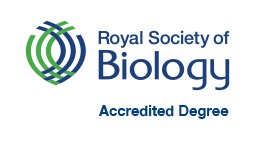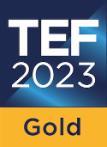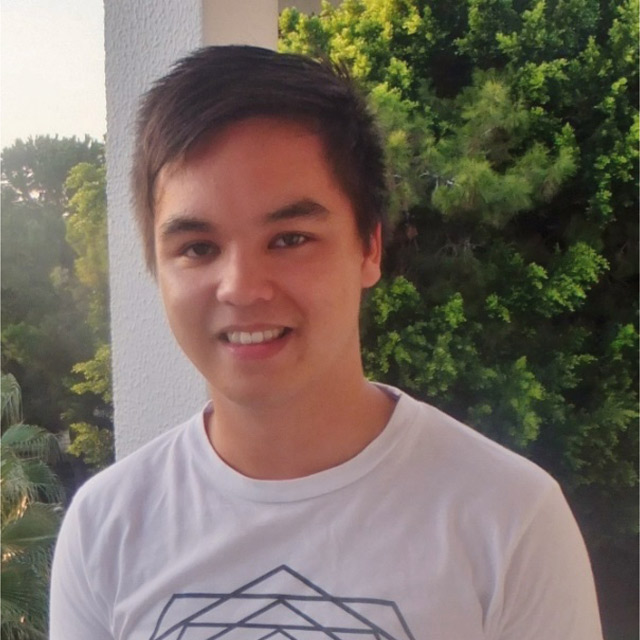Biochemistry and Neuroscience - BSc (Hons)
From understanding how biological processes can affect the risk of disease to exploring the fascinating complexity of the human brain, our Biochemistry and Neuroscience BSc will arm you with a strong set of analytical, scientific and research skills suited to a variety of careers or further study.
Year of entry
- 2025
Course type
- Combined Honours
UCAS code
- BC17
Duration of study
- 3 years / 4 years with international or placement year
Why study Biochemistry and Neuroscience at Keele University?
Accreditation and professional recognition
This course is accredited by the Royal Society of Biology for the purpose of meeting in part the academic and experience requirement for the Membership and Chartered Biologist (CBiol).
Graduates from accredited degree programmes are equipped with well-rounded knowledge and skill sets, making them highly employable both within and beyond their chosen field.

Teaching Excellence Framework GOLD
Keele University has been awarded the highest rating of gold in the teaching excellence framework (TEF), 2023. The TEF assessment identifies excellence in the educational experience and outcomes of our students, focusing on all undergraduate courses and students.

Additional opportunities
There are a range of additional opportunities available when studying this course.
Please note, undertaking one may impact upon the availability of another.
Entry requirements
The following section details our typical entry requirements for this course for a range of UK and international qualifications. If you don’t see your qualifications listed, please contact us to find out if we can accept your qualifications. If you don't think you'll meet the entry requirements specified, you may be able to gain entry to this course via a Foundation Year.
Typical offer
Please ensure that you read the full entry requirements by selecting your qualifications from the dropdown menu below. This will include any subject specific, GCSE/Level 2 Maths, and English language requirements you may need.
Please select your qualification from the drop-down list below for the full entry requirement information
A Level
ABB in three A Levels including B in Chemistry and B in one other Science subject from the Keele Defined Sciences List.
Contextual Offer: BBC in three A Levels including B in Chemistry and B in one other Science subject from the Keele Defined Sciences List.
You will also need: 4 / C in GCSE Maths or Level 2 Functional Skills Maths, plus an English language qualification (see below).
BTEC Extended Diploma / National Extended Diploma
DDM in any of the following BTEC Extended Diplomas / National Extended Diplomas: Applied Science, including completion of three out of four of the following units: Applications of Organic Chemistry, Applications of Inorganic Chemistry, Industrial Chemical Analysis, Practical Chemical Analysis.
Contextual Offer: DMM in any of the following BTEC Extended Diplomas / National Extended Diplomas: Applied Science, including completion of three out of four of the following units: Applications of Organic Chemistry, Applications of Inorganic Chemistry, Industrial Chemical Analysis, Practical Chemical Analysis.
You will also need: 4 / C in GCSE Maths or Level 2 Functional Skills Maths, plus an English language qualification (see below).
BTEC National Diploma / Diploma
Distinction and Merit in any BTEC National Diploma / Diploma and B in Chemistry A Level, or Distinction and Merit in Applied Science BTEC National Diploma / Diploma including completion of three out of four of the following units: Applications of Organic Chemistry, Applications of Inorganic Chemistry, Industrial Chemical Analysis, Practical Chemical Analysis, and A in any A Level.
You will also need: 4 / C in GCSE Maths or Level 2 Functional Skills Maths, plus an English language qualification (see below).
BTEC National Extended Certificate / Subsidiary Diploma
Distinction in any BTEC National Extended Certificate / Subsidiary Diploma and BB in two A Levels including B in Chemistry and B in one other Science subject from the Keele Defined Sciences List, or Distinction in Applied Science BTEC National Extended Certificate / Subsidiary Diploma and BB in two A Levels including B in Chemistry.
You will also need: 4 / C in GCSE Maths or Level 2 Functional Skills Maths, plus an English language qualification (see below).
T Level
Distinction in any of the following T levels: Science, with specialism in Laboratory Sciences.
You will also need: 4 / C in GCSE Maths or Level 2 Functional Skills Maths, plus an English language qualification (see below).
International Baccalaureate Diploma
655 in three Higher Levels including 5 in Chemistry and in one other Science subject from the Keele Defined Sciences List at Higher Level, or 32 points including 5 in Higher Level Chemistry and 5 in one other Higher Level Science subject from the Keele Defined Sciences List.
Contextual Offer: 554 in three Higher Levels including 5 in Chemistry and 5 in one other Science subject from the Keele Defined Sciences List at Higher Level, or 29 points including 5 in Higher Level Chemistry and 5 in one other Higher Level Science subject from the Keele Defined Sciences List.
You will also need: 4 / C in GCSE Maths or Level 2 Functional Skills Maths, or 3 in IB Middle Years Maths, or 3 in IB Diploma Standard Level Maths (any), plus an English language qualification (see below).
International Baccalaureate Career-Related Programme
We encourage applications with the IBCP but recognise that your combination of qualifications may differ depending on where you are studying.
If you are taking a BTEC National Diploma / Diploma with one or more Higher Levels, your offer will be similar to our BTEC + A Level offer (see 'BTEC National Diploma / Diploma') but with an HL requirement of 6 for A, 5 for B, or 4 for C.
For any other combination, please contact the University Admissions Team for advice.
Access to HE Diploma
128 UCAS points in an acceptable Science Access to HE including Distinction in at least 30 Level 3 credits and Merit in at least 15 Level 3 credits.
You will also need: 4 / C in GCSE Maths or Level 2 Functional Skills Maths, plus an English language qualification (see below).
Welsh Baccalaureate / Bagloriaeth Cymru
The Advanced Skills Challenge Certificate is equivalent to one full A Level at the same grade and can be included alongside 2 other A Levels in a standard A Level offer for this course (see A Level). All subject specific requirements will still need to be met.
Scotland - Highers and Advanced Highers
BBBBC in five Highers including Chemistry Higher, or BC in two Advanced Highers and CC in two Highers including Chemistry Higher or Advanced Higher, or BCC in three Advanced Highers including Chemistry Advanced Higher.
You will also need: C in National 5 Maths, or 4 / C in GCSE Maths or Level 2 Functional Skills Maths, plus an English language qualification (see below).
Extended Project Qualification (EPQ)
If you have B or higher in the EPQ and are studying A Levels, BTEC, the International Baccalaureate Diploma, or an Access to HE Diploma, you will typically receive an alternative offer which will be lower than the standard offer. Please see 'Alternative and contextual offers' below.
Core Maths
If you have B or higher in Core Maths and are studying A Levels, BTEC, the International Baccalaureate, or an Access to HE Diploma, you will typically receive an alternative offer which will be lower than the standard offer. Please see 'Alternative and contextual offers' below.
Ireland - Leaving Certificate
H3, H3, H3, H4, H4, H4 in the Irish Leaving Certificate including H4 in Chemistry or Physics and Chemistry (combined) and H4 in one other subject from the Science or Applied Science Groups.
You will also need: O4 / H6 in Maths, plus an English language qualification (see below).
China - Gaokao
75% in the Gaokao including 70% in Chemistry.
You will also need: 60% in Senior Secondary School or Gaokao Maths, plus an English language qualification (see below).
India - Standard XII
Average of 75% from four subjects including 70% in Chemistry in the ICSE, CBSE or Western Bengal Standard XII, or average of 80% from four subjects including 75% in Chemistry in any other Standard XII.
You will also need: 6 or C2 in Secondary School Examination Maths, or Pass in Standard XII Maths, plus an English language qualification (see below).
Germany - Abitur
2.0 overall average in the Abitur including 12 in Chemistry and 12 in Geography, Psychology, Maths, Physics, Biology, Computer Science, Technology, Nutritional Science or Sports.
You will also need: 10 in Maths in the Abitur, plus an English language qualification (see below).
France - Baccalaureate
14 in the French Baccalaureate/International Option Baccalaureate with 13 in Chemistry / Physics and 13 in Maths, Science, Sport, Engineering Sciences, Life and Earth Sciences or Information Technology, or 13 in the Baccalauréat Français International with 13 in Chemistry / Physics and 13 in Maths, Science, Sport, Engineering Sciences, Life and Earth Sciences or Information Technology.
You will also need: 10 in Maths in the Baccalaureate, plus an English language qualification (see below).
Hong Kong - Diploma
544 from two electives and one core subject in the HKDSE including 4 in Chemistry and 4 in Maths, Physics, Biology, Geography, Design and Applied Technology, ICT or Physical Education.
You will also need: 2 in HKDSE Maths, plus an English language qualification (see below).
Spain - Bachillerato
Italy - Diploma di Esame di Stato
85% in the Esame di Stato including 8 in Chemistry and 8 in Maths, Physics, Natural Science, Geography, Physical Education, or ICT.
You will also need: 5 in Maths in the Diploma, plus an English language qualification (see below).
Cyprus - Apolytirion
18.5 / 88% in the Apolytirion including 18 in Chemistry and 18 in Biology, Computer Science, Design and Technology, Information Technology, Geography, Maths, Physical Education or Physics.
You will also need: 14 in Maths in the Apolytirion, plus an English language qualification (see below).
Portugal
Overall average of 16 in a Secondary Certificate including 16 in Chemistry and 16 in Maths, Biology, Physics, Geology, Geography, Computer Applications, Psychology, Physical Education.
You will also need: 10 in Secondary Certificate Maths, plus an English language qualification (see below).
Canada - Diploma
70% / BBBBC in five courses in the Grade 12 Diploma including 70% in Chemistry and 70% in Advanced Functions, Biology, Calculus and Vectors, Computer Science, Maths of Data Management or Physics.
You will also need: 50% in Grade 11 Maths, plus an English language qualification (see below).
Kenya - KCSE / Diploma
We do not accept the Kenya Certificate of Secondary Education for direct entry. However, you can apply to study an International Foundation Year at Keele University International College. On successful completion, you can progress to an undergraduate degree at Keele.
We may accept a two year Diploma. Please contact the University Admissions Team for advice.
Nigeria - Senior School Certificate / OND
We do not accept the Senior School Certificate (WAEC or NECO) for direct entry. However, you can apply to study an International Foundation Year at Keele University International College. On successful completion, you can progress to an undergraduate degree at Keele.
We may accept an Ordinary National Diploma with GPA of 2.5 or a Merit / Lower Credit. Please contact the University Admissions Team for advice.
USA - Advanced Placement
544 from three Advanced Placement subjects including 4 in Chemistry and 4 in Calculus (either), Physics (any), Biology, Computer Science (either), Environmental Science, Psychology or Statistics.
You will also need: C in Grade 12 High School Diploma Maths, plus an English language qualification (see below).
Ghana
We do not accept the West African Senior School Certificate Examination for direct entry. However, you can apply to study an International Foundation Year at Keele University International College. On successful completion, you can progress to an undergraduate degree at Keele.
Sri Lanka - Advanced Level
ABB in three Advanced Levels including B in Chemistry and B in Combined Maths, Physics, ICT, Biology or Agricultural Science.
You will also need: C in O-level Maths, plus an English language qualification (see below).
Malaysia - STPM
ABB in three Principal Level subjects in the STPM including B in Chemistry and B in Maths, ICT, Physics, Biology, Geography, or Sports Science.
You will also need: C in SPM Maths, plus an English language qualification (see below).
Pakistan - Secondary School Certificate
We do not accept the Secondary School Certificate for direct entry. However, you can apply to study an International Foundation Year at Keele University International College. On successful completion, you can progress to an undergraduate degree at Keele.
Singapore - A Levels (H2)
ABB in three H2 levels including B in Chemistry and B in Biology, Physics, Computing, Maths, Further Maths or Geography.
You will also need: C in O-level Maths, plus an English language qualification (see below).
European Baccalaureate
75% overall with 7 in Chemistry and 7 in Maths (3 or 5 period), Physical Education, Biology (2 or 4 period), Geography (2 or 4 period), or Physics.
You will also need: 6 in European Baccalaureate Maths, plus an English language qualification (see below).
NCUK
Pass NCUK Foundation Year with ABB including B in Chemistry and B in one other Science subject from the Keele Defined Sciences List. Grade C in EAP English Language module.
You will also need: 4 / C in GCSE Maths or international equivalent.
Uganda - Advanced Certificate of Education
ABB in three Principal Level subjects in the Advanced Certificate of Education including B in Chemistry and B in Maths, Physics, Biology, or Geography.
You will also need: 6 in UACE or UCE Maths, plus an English language qualification (see below).
Zimbabwe - Advanced Level GCE
ABB in three Advanced Level subjects including B in Chemistry and B in Additional Maths, Agriculture, Animal Science, Biology, Building Technology, Computer Science, Crop Science, Food Technology and Design, Geography, Horticulture, Mechanical Maths, Metal Technology and Design, Physics, Pure Mathematics, Sport Science and Technology, Statistics, or Technical Graphics and Design.
You will also need: 4 / C in GCSE Maths or Level 2 Functional Skills Maths, plus an English language qualification (see below).
English language requirements
All of our courses require an English language qualification or test. For most students, this requirement can be met with a 4 or C in GCSE English. Please see our English Language guidance pages for further details, including English language test information for international students. For those students who require an English language test, this course requires a test from Group A.
Alternative and contextual offers
We're committed to ensuring equality of opportunity to all our applicants with the potential and motivation to succeed, regardless of background. That's why we operate a range of alternative offer schemes with clear eligibility criteria, including contextual offers, offers for those studying within the Keele region, and recognising a range of additional qualifications in your offer.
General information
The entry grades outlined in this section indicate the typical offer which would be made to candidates, along with any subject specific requirements. This is for general information only. Keele University reserves the right to vary offer conditions depending upon a candidate's application.

"The course enabled me to gain a broad perspective of different aspects of Human Biology. From studying cells and biological molecules to learning about organ systems. After completing my degree I was accepted onto AstraZeneca's Innovative Medicines and Early Development graduate programme. "
 (1).jpg)
"I gained invaluable experience working in Malaysia on a three month research project which was secured by way of application and interview with the department of Life Sciences. "
Central Science Laboratories
Develop your practical skills in Keele's state-of-the-art Central Science Laboratories
Foundation year
Our Foundation Year provides an excellent alternative route to Keele, providing a unique opportunity to better prepare for your chosen degree, and with guaranteed entry onto your undergraduate course once you successfully complete your Foundation Year.
This extra year of study can improve your academic skills, expand your subject knowledge, give you a better understanding of higher education and, perhaps most importantly of all, build your confidence.
Keele University is consistently ranked among the top universities for student satisfaction, and we have over 70 years' experience of teaching a foundation year to students. On the Keele Foundation Year, you'll study on campus, joining our undergraduate community from the outset, with access to all the facilities and support that you'd get as an undergraduate student at Keele.
The information in this Foundation Year section is for UK/Home applicants. Where an international Foundation Year is available, please see the 'Information for international students' tab.
The information within this page is for students wishing to start their studies in September. If you would like to start this course in January, please visit our January pages for further details.
Course Content
Our Foundation Year allows you to develop your critical thinking, academic reading, writing, and communication study skills along with subject-specific knowledge and skills which will be invaluable in your academic studies and beyond. Upon meeting the progression criteria and successfully completing our Foundation Year, you will automatically progress into your Keele undergraduate degree with the confidence that you have the skills, and knowledge needed to successfully complete your course.
The Keele Foundation Year is a two semester programme which provides a tailored pre-degree programme of study to better prepare you for the BSc (Hons) Biochemistry and Neuroscience degree. For example, the Foundations of Life Sciences module looks at basic cell biology in terms of structure and function and go on to examine how cells obtain their energy and raw materials. It considers how organisms interact and analyses the effects of climate change on ecosystems. In addition, the Foundations of Chemistry module will provide you with a basic understanding of the key concepts and fundamental terminology of chemistry. Course content has been developed in collaboration with degree teaching teams, so that by the time you begin Year 1, you will be ready to excel at your studies, as the majority of our Foundation Year students do.
Find out more about the Keele Foundation Year, including information about teaching and assessment methods by visiting the Foundation Year homepage.
Course Structure
The module details given below are indicative, they are intended to provide you with an idea of the range of subjects that are taught to our current students. The modules that will be available for you to study in future years are prone to change as we regularly review our teaching to ensure that it is up-to-date and informed by the latest research and teaching methods. The information presented is therefore not intended to be construed and/or relied upon as a definitive list of the modules available in any given year.
Semester One Modules
| FYO-00185 | Practical and Academic Skills in Science | 15 credits |
| FYO-00211 | Foundations in Numerical and Quantitative Methods for Scientists | 15 credits |
| FYO-00189 | Foundations of Chemistry | 15 credits |
| FYO-00197 | Foundations of Life Sciences | 15 credits |
Semester Two Modules
| FYO-00199 | Advancing Life Sciences | 30 credits |
| FYO-00191 | Advancing Chemistry | 30 credits |
Entry Requirements
The entry grades outlined in this section indicate the likely offer or range of offers which would be made to candidates along with any subject specific requirements. This is for general information only. Keele University reserves the right to vary offer conditions depending upon a candidate’s application. Read more about our undergraduate entry requirements.
- 56 UCAS points including at least one Level 3 qualification (such as an A Level, BTEC, Access Course, or T Level)
- Plus C in GCSE English / Level 2 Functional Skills English and C in GCSE Maths / Level 2 Functional Skills Maths
How to Apply
Students will need to apply for Biochemistry with Foundation Year (UCAS code C703) through UCAS at www.ucas.com. You will be contacted to confirm your second subject by a member of our team.
Direct Entry Students
If you already have your qualifications, are not expecting any further results and only wish to apply to Keele, please contact the Admissions Office directly.
The information in this Foundation Year section is for UK/Home applicants. Where an international Foundation Year is available, please see the 'Information for international students' tab.
We also offer a January start for some of our Foundation Year courses. Adopting a blended learning approach, the January start is particularly useful for students wishing to return to education following time out of studying, or who are seeking a flexible approach to their Foundation Year studies. Our January start is available across most of our Science, Humanities, Social Science and Business courses.
Whilst still being a full-time course, our blended delivery model combines live teaching sessions - both online and on-campus - with self-directed study, enabling you to predominantly study at a time that suits your lifestyle. You will benefit from weekly online taught sessions which encourage you to engage with your teachers and peers.
In addition to online study there will be a series of full study days that you will be required to attend throughout each semester. These sessions may include lab-based activities, group work, review of course and assessment materials studied online. They will emphasise opportunities for you to deepen your knowledge and understanding of your chosen route.
Please refer to the September start tab for more information about the entry requirements and what you will study. The modules that you will take on a January start Foundation Year will be similar to those for the September start, but on a compressed timescale and tailored to a blended learning approach (with the majority of learning taking place online).
For more information, including fees, the UCAS code for this course, how to apply, and how you will be taught, please visit our January Start Foundation Year webpage.
Our International Foundation Year is delivered on campus through Keele University International College (KUIC). Find out more about the International Foundation Year options on the KUIC website.
Discover the Keele difference
Everything’s on your doorstep at Keele, and you’ll soon feel at home and make friends wherever you go.
We help students manage their money and ensure that they receive any funding for which they may be eligible.
Make yourself more employable after graduation by taking advantage of the whole host of additional opportunities.





